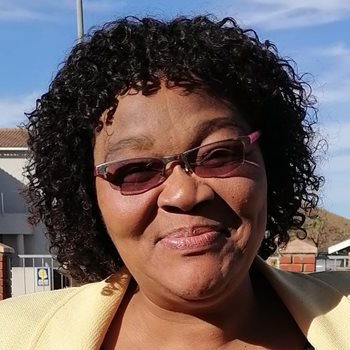
Dr Busisiwe Lujabe
I obtained my BA (Social work) from the University of the Witwatersrand in 1991. I have worked with Non-Governmental Organizations, Faith-Based Organizations, Community Based Organizations, Government and Para-Statals as a Social Worker and Social Development Practitioner as well as an Education, Training and Development Practitioner, involved with programmes aimed at the upliftment of impoverished communities from 1991-2010. From 2011-2012 I embarked on a Masters programme in Development Studies in Nelson Mandela University and my research focused on investigating the impact of poverty reduction programmes in King Sabata Dalindyebo Municipality. After graduating my MA (Development Studies) in April 2013, I was contracted as an associate lecturer with the Department of Social Development Professions in Nelson Mandela University from 2014-2017, involved in teaching and learning activities, assessment of learning and student supervision. I further enrolled for DPhil (Social development) from 2013-2018, focusing on the role of the Church in Social Development: Developing a strategy to enhance the role of the Church as a social service delivery agent in addressing poverty in contemporary South Africa. From 2020-2021 I pursued my research career as a Postdoctoral Fellow, involved in Community-Based Participatory Action Research in the area of household food security which engages a vulnerable community that is challenged by high levels of poverty.
Synopsis of Postdoctoral Study
Title: Exploring transdisciplinary perspectives and pathways towards enhancing household food security in ward 60 (Wells Estate) of Nelson Mandela Bay Municipality using Community-Based Participatory Action Research (CPAR) and Transdisciplinary (TD) Research Approaches (Phase 2 and Phase 3)
My postdoctoral research project focuses on exploring the household food security status of households in ward 60, NMBM (Wells Estate). Household food insecurity is a critical global challenge. The complexity of the global food insecurity challenge demands innovative ways of identifying both problems and possible solutions of addressing this challenge. In the current South African context of large-scale poverty and unemployment, as well as the present economic downturn, it is probable that the challenge of food insecurity facing surrounding low-income communities and poor households will continue, if not increase. It is thus essential that creative solutions are found to address household food insecurity. Hence, the goal of the proposed postdoctoral research was first, for phase 1, to determine the extent of food (in)security of households in Wells Estate of Ward 60 in Nelson Mandela Bay Municipality (NMBM). In 2022 I’m pursuing phase 2 of my postdoctoral study focusing on exploring transdisciplinary perspectives and pathways towards enhancing household food security in ward 60 (Wells Estate) of Nelson Mandela Bay Municipality using Community-based participatory research (CBPR) and Transdisciplinary Research Approaches. The aim is to help design an implementable and sustainable community-driven development initiative that is aimed at enhancing household food security and reducing poverty.